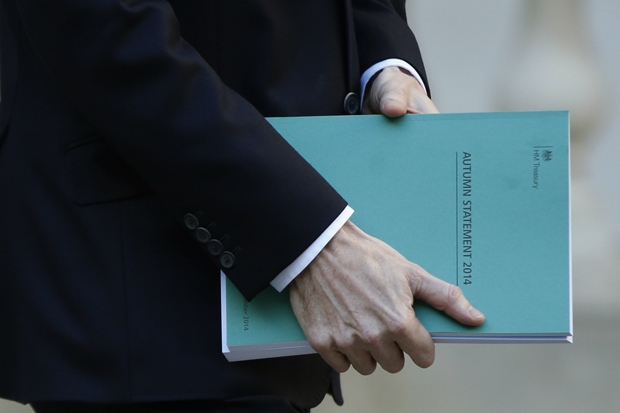When George Osborne first became Chancellor, he asked to be judged on his ability to reduce the deficit. He does not make that request any more. This year’s deficit is almost three times higher than the £37 billion he originally planned, but he understandably glossed over this point when delivering his Autumn Statement. He has other interests now: pension reform, building motorways, or spending more on GPs. The mission to balance the books has been delayed until the end of the decade — or, perhaps, the start of the next.
He said this week that his extra spending was made possible by ‘the hard decisions that we have taken’. This can only mean the hard decision to abandon his deficit target and give himself eight long years to reduce state spending by a grand total of 4 per cent. The global crash in interest rates has made this lax timetable possible — Osborne can now borrow at just 2 per cent, less than half the rate he expected. The market is hawking cheap loans around the continent, and the Chancellor has succumbed.
But he had other successes to proclaim this week. The most striking is job creation, which is stronger than even HM Treasury seems able to comprehend. There are a record 30.8 million now in work, half a million more than Osborne predicted last year. Almost nine out of ten new jobs are full-time. The Chancellor was right to boast about a thousand jobs being created for every day the government has been in office. Britain’s record on this front is the envy of Europe — which is a bit of a problem, given how many Europeans are arriving to avail themselves of work, which is painfully absent in their own countries. So if the Home Secretary’s immigration target lies in tatters, this is why — the French, Portuguese and Italians coming here to help the British recovery.
The flipside of this, of course, is that wages are still far lower than before the crash. Workers are cheaper, which is why companies can afford to hire more of them. The Chancellor glossed over this point in Parliament, which is unwise of him. It’s not as if people facing yet another year of pay freeze will not notice. The Conservatives ought to recognise that their job-creation miracle is partly explained by an unwelcome trend of low wages.
The answer to this is a sound economic recovery that conservative principles ought to bring. But the fact remains: you need to go back to the 1860s to find a period when the average British wage had been knocked back so badly. No matter what statistics say, for the average worker this has been a lost decade.
But for British businesses, these are fairly good times — thanks to his corporation tax cuts. When Osborne took office, the tax rate stood at 28 per cent. It’s now 21 per cent and falling to 20 per cent next year. Just as he predicted, this has encouraged businesses to expand and invest in Britain. And as good economists would expect, the result of this lower tax rate has been higher tax yields — revenue from corporation tax is up 5 per cent year on year, far more than expected. Of course, companies cannot pay tax — only people can, through paying higher prices. Britain is not seeing very much of that, with inflation now expected to average 2 per cent next year.
The Chancellor has also been rewarded for cutting the top rate of income tax from 50p to 45p. As he realised, the top rate of tax has totemic significance for a country — it represents the way that government sees entrepreneurs. Are they seen as welcome wealth-creators, or cash cows to milk? Osborne understands the importance of economic mood music, and would have cut the rate to 40p had Nick Clegg not vetoed it. But even cutting it to 45p has seen a leap in the share of income tax contributed by the best-paid 1 per cent to a record high in the last financial year.
Osborne has squeezed the rich more effectively than any Chancellor in recent history — by cutting the top rate. He has seen corporation tax jump after that rate was also cut. He has helped encourage a jobs miracle by cutting income tax (or by raising the starting rate, at least — and raising it again this week).
It is depressing that he still cannot quite bring himself to acknowledge this point, and is instead (yet again) snarling at the rich, advocating various clampdowns. He is right to say that the richest are making the greatest contribution to balancing the books, but they are doing so because of his fiscal restraint rather than his occasional banker-bashing and crude tax grabs.
Where Osborne has been brave, things have worked out very well. When he has been pusillanimous, as he has with spending reform, things have worked out badly. Like a child peeling a plaster off slowly so as to minimise the pain, he seems to believe that spreading the cuts over eight years will make them hurt less. Instead, it just protracts the agony.
After almost five years, experience has taught George Osborne what this magazine advised him at the start of this government — the bolder, the better. If he is still Chancellor at the next general election, it is hoped he will implement what he has learned.






Comments